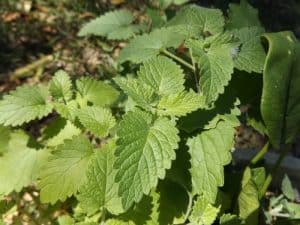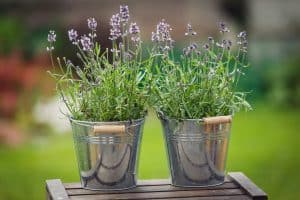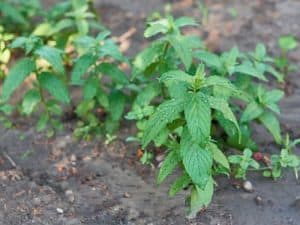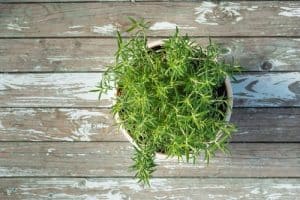“This post contains affiliate links, and I will be compensated if you make a purchase after clicking on my links.”
For many pet parents, the warmer weather is a welcomed treat. We get to spend more time outdoors with our four-legged companions, enjoying the sunshine, participating in fun outside activities. But, warmer weather brings the beginning of the dreaded mosquito season.

Not only are these pesky, winged biters annoying, they can lead to a slew of complications ranging from itchy bites and hot spots, to heartworm disease and West Nile Virus, and more.
Unfortunately, many of the effective pesticides and mosquito repellents we use to protect ourselves are highly toxic, even deadly, to our furriest family members. Luckily, it’s easy to safely and naturally repel mosquitoes from your yard with a little creative landscaping using these 6 dog-safe plants that naturally repel mosquitoes – and other pests, too!
Basil (Ocimum basilicum)

This hardy, easy-to-grow plant is more than just a tasty addition to your favorite recipes – it naturally deters mosquitoes, too! Unlike most other insect-repelling herbs, basil doesn’t have to be crushed or ground in order to release the scent and oils that keep mosquitoes at bay. There are a wide variety of basil plants, all of which provide some relief from the flying pests, but lemon basil and cinnamon basil are the most effective. Bonus: Basil plants naturally repel house flies, too!
Catnip (Nepeta cataria)

We all know cats (and some dogs!) love catnip. But, mosquitoes absolutely hate it! Some studies have actually shown catnip to be several times more effective at repelling mosquitoes than DEET, a potentially dangerous chemical used in many bug repellents. Catnip is easy to grow and can be planted in pots strategically placed around the yard and seating areas to keep bugs at bay. Just remember, while you’re repelling mosquitoes, you might be attracting the neighborhood cats…
Lavender (Lavandula angustifolia)

In addition to being a beautiful, colorful, and fragrant addition to your garden, mosquitoes despise the calming, fresh scent of lavender. Lavender can be planted in your garden, right in the ground, or grown in pots on your deck, porch, or windowsill, both indoors and out for a splash of color, a fresh, calming fragrance, and to keep those tiny vampires away from you and your pets.
Although Lavander does contain the noxious compound linalool, it is in low enough concentrations to consider the plant non-toxic. In other words, your pet would need to devour a huge quantity of lavender plants for problems to arise.
Lemon Balm (Melissa officinalis)
Lemon Balm, also known as horsemint, is another hardy, easy-to-grow plant that naturally repels mosquitoes. Thriving well in both sunny spots or in the shade, this plant gives off a strong scent similar to citronella that mosquitoes despise. Grow it in a pot and place in the center of your patio table, beside entryways, or around the yard to keep the area clear of mosquitoes. And, best of all, while mosquitoes can’t stand Lemon balm, bees and butterflies don’t mind it at all!
Peppermint (Mentha piperita)

Because of its strong, minty aroma, many insects, including mosquitoes, steer clear of peppermint plants. However, because these plants tend to grow aggressively, you may prefer planting them in pots and strategically placing them around sitting areas, on windowsills, and near entryways, rather than planting in the ground. Plus, while they’re non-toxic to dogs, many enjoy the taste and smell and will nibble or roll around in them, killing the plant.
Bonus: Use the leaves to add flavor to teas and other delicious minty recipes!
Rosemary (Rosmarinus officinalis)

Another pet-safe option for naturally repelling fleas, that’s also useful in the kitchen, is rosemary. Unpleasant to both mosquitoes and other flying insects, rosemary is quite versatile.
Plant in pots protect your herb garden from insects, or use around the perimeter of your yard to keep insects away while at the same time attracting butterflies.
Plants to avoid:
The plants listed above aren’t the only ones that naturally repel mosquitoes – but they ARE the plants that are both effective against insects AND safe for dogs. Always remember when designing your garden to be mindful of plants which may be toxic for your fur-family. Citronella, while highly effective against mosquitoes, is deadly to dogs, as are Geraniums, certain varieties of Marigolds, and Garlic plants.
For more information about landscaping – especially with dogs in mind, check out this PAW-some article on Dogscaping!


















































Neil
Aug 15, 2021 at 10:21 am
Several if these plants are toxic to dogs according to THE ASPCA
Taressa J Snyder
Jun 15, 2021 at 9:08 am
According to the ASPCA Lavender is toxic to dogs and cats.
Brandy Arnold
Jun 15, 2021 at 11:40 am
Although Lavandula Angustifolia does contain the noxious compound linalool, it is in low enough concentrations to consider the plant itself as non-toxic. For this reason, lavender is often listed a safe plant to grow in gardens where dogs are allowed to roam free. In other words, your pet would need to devour a huge quantity of lavender plants for problems to arise.
Tomika
Dec 11, 2019 at 7:57 pm
I live in the sunny, mosquito capitol, Florida. Mosquitoes were driving me and my beloved pets loopy. A couple of years ago, I started planting flowers to help. Lemongrass and Citronella mostly. It helped a LOT but still needed more. This past summer I added lavender to the plant list and installed a propane mosquito trap as well. Even as summer turned to fall, and now into the even chillier months, we have seen so much fewer problems with mosquito bites. When combined with the flea and tick preventive that I use, my dogs barely scratch. I just wanted to suggest it here because it worked so well for us.
Lina
Jun 9, 2019 at 11:22 pm
It’s a little late now, but maybe next Spring we will try some of these!
Pingback: What’s All the Buzz About Mosquitoes & Dogs? – FurBabies Play
christine
May 3, 2019 at 9:42 am
where did you get information that citronella is deadly to dogs?? I have been using it for over 15 years and never had a problem.